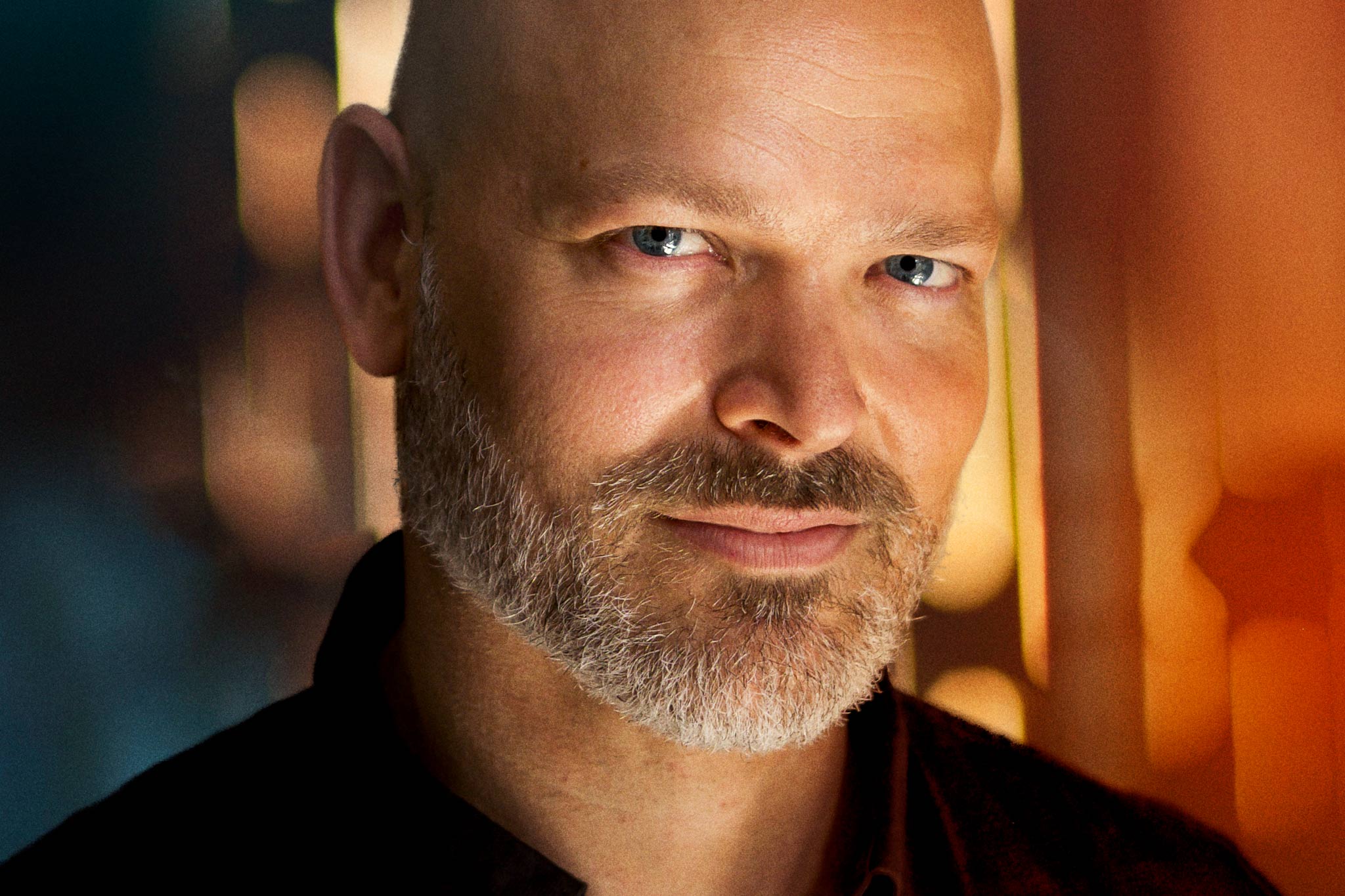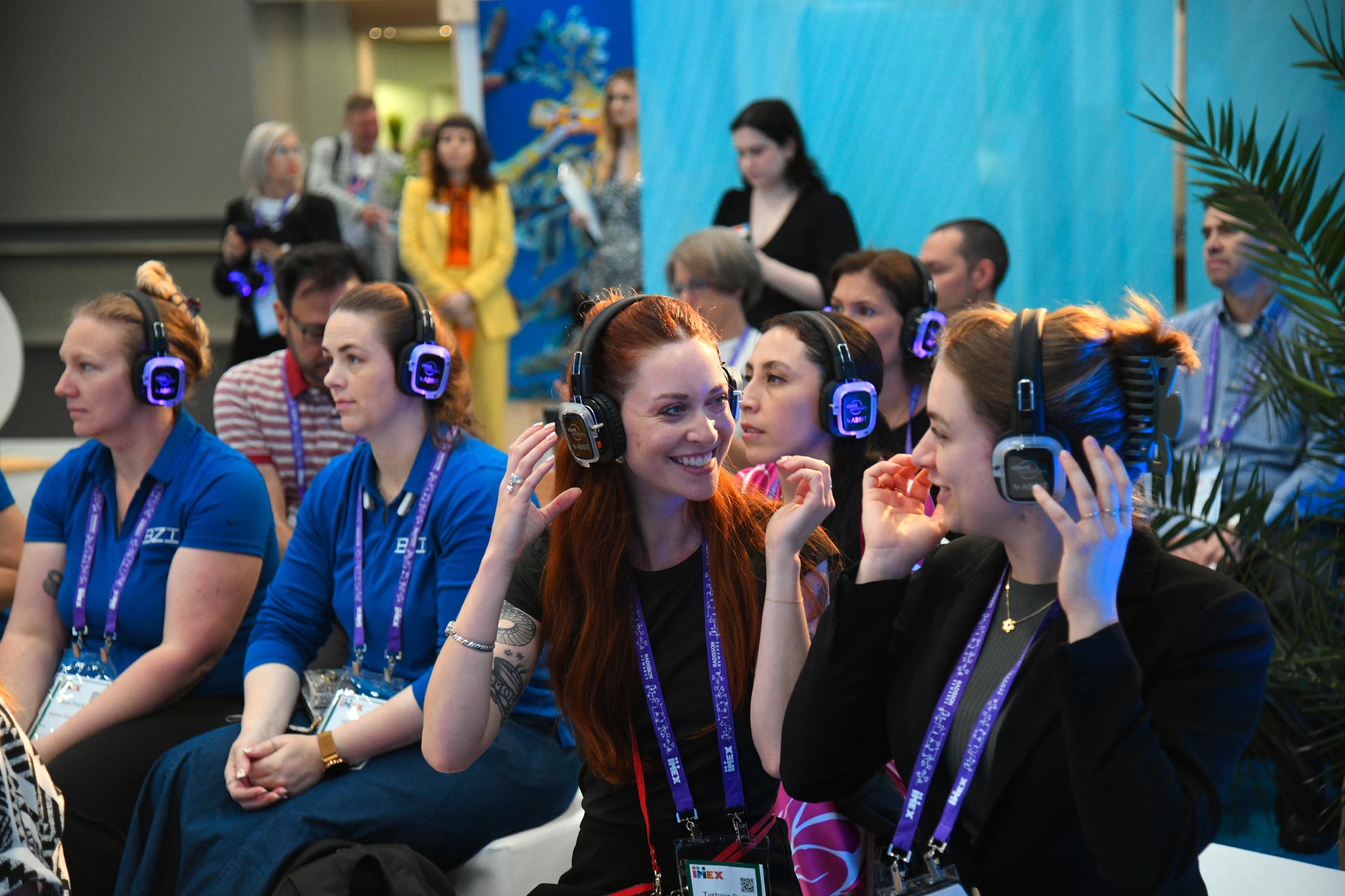Philippe Longchamps has received a great deal of international attention lately. He is the French-Canadian immigrant who was named Sweden’s best teacher in 2020. “To be a good teacher is to be a good salesman.”
During last year, Philippe Longchamps has been seen and heard in numerous TV and radio interviews in Swedish, Canadian and even Korean media (because he often uses educational tools from South Korea in his teaching). He works as a high school teacher at the Bilingual Montessori School of Lund in southern Sweden and has been presented with the country’s best teacher award.
“It’s funny, but a lot of media stuff the feature with me at the end of their news program, and introduce it as something like this: ’With Covid-19 and all the bad things in the world, let’s end on a good note: Philippe Longchamps, Canadian immigrant, has been named Teacher of the Year – in Sweden!’”
He sits quietly for a while.
“It still feels surreal to see myself on TV and that I have received this great honour in my new homeland.”
As a teacher, Philippe Longchamps draws inspiration and lessons from such diverse phenomena as the consumer society’s most predatory sales ploys. Also, from training-practices in tough team sports such as ice hockey and baseball, and the priests’ and nuns’ memorisation pedagogy in the Catholic boarding school he attended while growing up in Quebec. Some things he wants to emulate in his teaching, others he wants to get as far away from as possible.
He is obviously doing something right. The Chamber of Commerce, which is the organisation behind Sweden’s best teacher award, calls his contribution unique and innovative and writes in the motivation: “Through an interdisciplinary approach, he and his students find areas where science, technology, art, mathematics and engineering interact. With great curiosity, influences and pedagogical techniques taken from South Korea, Japan and Hong Kong, enthusiastic participation is created in the classroom.”
Philippe Longchamps shows me around the school, situated in Lund’s medieval city, which also has Sweden’s oldest and most prestigious university. The premises are cramped but functional for the teaching that is conducted, he assures.
He came to Sweden in 2002 following his love, the Swede Lina who had been an exchange student in Montreal, when she moved home.
Philippe Longchamps currently teaches history, technology, and geography, based on Swedish text-books, but leads the lessons in English, with elements of French and Spanish concepts when relevant to their vocabulary and general education.
If there is one thing that characterises his teaching in the physical space, it is flexibility, he states. Lectures in front of the whiteboard are interspersed with theatrical interludes for the whole class or robot building at various workstations in the classroom. Furniture is there to be moved. A seminar is held at the round table while students sit in U-shape when discussing debates.
“Science is a way of thinking, of looking critically at the world with an open mind”
In some of the corridors, he has hung timelines of historical events, such as the Cold War.
“In the timelines, I put up pictures, maps and short texts, to trigger the students’ curiosity. The corridor is, of course, ‘prime space’ that everyone has to get through, and therefore I put excerpts from my teaching on display right here, just like I did at Costco and would sell radios or TVs.”
During his student days in Canada, he worked extra as a salesman at the American department store chain Costco Wholesale.
“Have you ever been to a Costco store? No? It is like the ‘temple of overconsumption’. Not something I’m proud of, but I learned so much there. It’s probably the best student job you can have.”
Philippe Longchamps worked in the “Impulse” department. He and his colleagues, dressed in red vests, energetically displayed products that the company could sell at great profit, such as televisions, microwaves or hot-tubs.
“The name of the department says it all. You want people to buy things they don’t need. We learned how to, in practice, dupe people to act impulsively. Items that people need, such as milk and toilet paper, are always at the far end of the department store and on the way there you have to go through the Impulse department.
“So, there you met my co-workers and me, and we became good at talking people over with arguments about what a good deal this would be for them and how that offer would never come back again.”
Although he has done much else in his life, he chose to take up that sales experience in his thank you speech for the award of Sweden’s best teacher, when he said: “To be a good teacher is to be a good salesman. As a teacher, you need to showcase, market and create the demand for knowledge. You have to succeed in selling your subjects so that the students understand their future knowledge needs.”
Like all teachers, he is used to questions from students, and then it can be useful to have experience from sales.
“Sometimes you might hear: ‘Why do we have to learn this, we will have no use for that?’ Then, I usually answer that you need knowledge for everything, for all future decisive situations that you have no idea about right now. Therefore, it is just as important to learn about Charles XII as trigonometry, statistics or different chemical reactions. As a teacher, you have to sell to students that all knowledge has value.”
Philippe Longchamps also notes that teenagers, thankfully, are usually receptive to tips on attractiveness in general.
“You have to succeed in selling your subjects so that the students understand their future knowledge needs”
“It is often enough that I point out that a well-educated person is more interesting. My advice is always to do what you can to become more educated because it will open more doors in situations that you cannot imagine today.”
“And if you have a foundation in a piece of specific knowledge, it will be easier for you to learn more about it later on and open other doors.”
We return to his formative early years in the Canadian forests. The Longchamp’s family lived half an hour drive from the US border in the suburb of Rock Forest, Sherbrooke, Quebec, “Typical Canada as you might imagine it”, he says and continues:
“My first memory of school was my very first day in preschool when I was five years old, in 1979. I remember stepping on the yellow school bus with my Star Wars lunchbox and feeling like I had come to a big playground. I can still have the feeling of school as a playground in my work today.”
However, not everything was idyllic growing up. Philippe Longchamps had reading and writing difficulties and describes himself as a daydreamer who preferred to draw famous landmarks such as the Eiffel Tower and the Taj Mahal instead of listening to the teachers.
“But there was a second-grade teacher, Laure Plante, who saw my interest in this and used it to adapt the teaching just for me. Instead of doing like any other teacher, and forcing me to read and struggle through certain things, she let me read and write about things that were my passion, like geography and history. Then suddenly, it started to go well for me, and I felt interested in reading and writing.”
When Philippe Longchamps was eleven years old, he moved to a Catholic boarding school for boys in Ayer’s Cliff. Everyone was afraid of the two nuns who taught French, he says.
“I was sort of brainwashed during my strict Catholic upbringing, and in a way, I still struggle to fill in certain gaps today. We had extreme respect for the monks and nuns. In high school, it was a lot about learning things by heart. For example, we had to learn to draw the world map by heart, which I can still do pretty well. We had to memorise a lot from the Bible and not reflect on it, of course.”
He looks out the window and down into the Lund school’s courtyard where the students rush out for a break.
“As a teacher, you have to sell to students that all knowledge has value”
“Today it is a waste of time memorising things if you ask me. It only takes two clicks, and you can find all the information on Google. And with a little source criticism, you can also find the right information. It’s dizzying to compare it to my schooling.”
“My students can Google the correct answers with their thumb on their mobile in three seconds. When I was their age, I had to cycle to the bus stop, hop on the bus, walk through town to the library, find the right book in the index file and look it up on the shelf, find the right spot on the table of contents and write my notes, go home again and then, only then, could I start writing my essay. So, it was half a day of my weekend that disappeared there.”
Lightning-fast access to all the world’s information, of course, gives today’s young people fantastic opportunities to outclass their teachers’ generations on an intellectual level.
“But, with all this information, there is a huge risk. It’s easy to get caught up in a digital bubble of confirmation bias because people just read and listen to things that confirm what they think they already know. We, teachers, have a huge responsibility to teach our students to question everything all the time. That is extremely important for the future.”
To teach students not to get caught up in digitally filtered bubbles of confirmation bias, Philippe Longchamps says he has to vary his methods, sometimes using role-playing games and even using pseudoscientific arguments in the classroom.
“During a geography lesson, I wanted to train students’ critical thinking abilities. So, I opened the lesson by apologising and explaining that everything I have said so far about the earth being round is wrong: ‘It is the government that wants me to teach you that, but it’s a conspiracy. The earth is flat’, and so I presented the arguments that the earth is flat, with theatrical feeling.”
“Is there not a risk here that students will begin to doubt that the earth is round? No, not at all, as I see it, on the contrary, I only reinforce their understanding of facts and their trust in scientific methods as the most reasonable, because they have to dig into science when they have to convince me that the earth is not flat at all. It is a good way for students to practice critical thinking, logic, mathematics, observation skills and knowledge of history, for example.”
Philippe Longchamps gets excited and cannot sit still on the sofa when he talks.
“I want them to fall in love with the scientific method because you can apply that to almost anything. Science is a way of thinking, of looking critically at the world with an open mind.” At the same time, science is not a belief system because science can always be improved.”
“The corridor is ‘prime space’ that everyone has to get through, and therefore I put excerpts from my teaching on display right here”
“I also say to my students: ‘Please, be sceptical even of scientific findings. Science is, of course, what we currently know to be true. But if you can show that Stephen Hawking or Albert Einstein were wrong, then you will win the Nobel Prize!’”
(The passion for science is, incidentally, reflected in Philippe Longchamps song lyrics for the band Atlas Volt, an endeavour he spends a considerable portion of his leisure time on.)
During his time at the boarding school in Quebec, Philippe Longchamps saw a lot of violence and bullying, but at the same time had many educational experiences in sports, especially ice hockey.
“In Canadian hockey, people fight on the ice, but afterwards they become friends. Well, not always, but often. Of course, there is a lot you can say about it. Still, today I can also see that I have brought positive aspects from sports into my teachings, such as building team spirit and how to use competition elements to encourage both individuals and groups. It is also a good starting point for discussions about solidarity and empathy.”
Even in Sweden, Philippe Longchamps has devoted much time to team sports. When he and his wife moved to the Dalarna province in central Sweden in 2005, he started playing elite-level baseball.
“We lived there for four years, and it was extraordinary, like being at home in Canada. In Dalarna, there is an American culture. They have Hillbillies driving around in vintage American cars, they like country music, and they love baseball.”
“In the cities of Leksand and Rättvik, there is a baseball tradition, so I started playing elite baseball and went all-in on it. We won the Swedish Cup in 2008 and played from Skellefteå in the north to Malmö in the south.”
A little unexpected perhaps, Philippe Longchamps has got the students at the Bilingual Montessori School of Lund to participate in several school competitions unexpectedly, because competitions run counter to Maria Montessori’s philosophy.
“That is so, but then I usually point out that we are only a Montessori-inspired school. We are flexible and opt out of what we perceive to be the more dogmatic aspects of the Montessori movement.”
Some of the competitions that the Lund School has participated in have revolved around 4DFrame, an educational tool developed in South Korea (therefore, the Korean media has claimed Philippe Longchamps and reported a lot about his success).
“Do what you can to become more educated because it will open more doors in situations that you cannot imagine today”
He happily demonstrates several of the students’ models of the colourful plastic pipes and various connections: everything from robot cars and windmills to a large model of the coronavirus.
With the help of 4DFrame, for example, he is not limited to just telling his students how the Romans could lift heavy stones, he can also show how it happened in practice.
He proudly says that the school will also be a test school for the new Lego Education Spike Prime, a new teaching tool in science, technology, art and mathematics.
“Why do I want my students to learn as much as possible? One answer is, of course, the obvious, that they are the future. They must find solutions to problems that we already have today and new ones on the horizon.
“Maybe it’s a selfish investment because I know that they will take care of me when I get old and maybe can develop a new medicine for the disease that I might get. It is also a long-term investment because it takes 20 to 25 years before you see the effect and the outcome of education of today.
But a good education is, of course, without comparison, the best investment any society can make.”
When asked what Philippe Longchamps would count as a teacher’s greatest success, the answer comes surprisingly quickly:
“Seeing their students work as if the teacher did not exist. It is our goal to inspire curiosity. We try to teach students to become independent and teach themselves. Sure, today there are other opportunities to learn things on your own, like tutorials on Youtube, but what the teacher has a unique opportunity to do, is motivate and ignite that spark that makes students throw themselves into finding new knowledge.”
“The old idea of a kind of almighty and infallible teacher is long gone, or should be at least. Of course, we want students to surpass us in learning, and we must humbly admit this to ourselves as teachers, and as parents for that matter. Learning never ends. We want the next generation to be more competent than we have been. Anything else is unsustainable and would, of course, be an incredible failure.”



